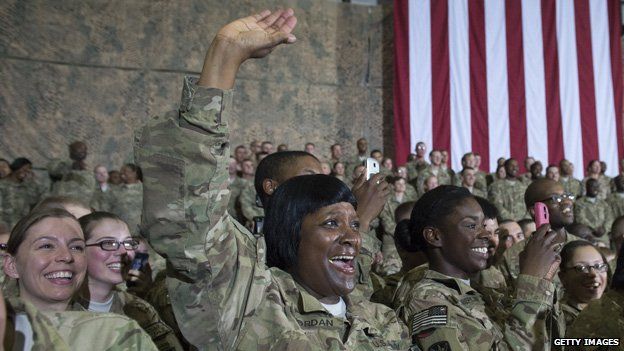Natural hair advocates take on the US Army
- Published

The US Army's new restrictions on which hairstyles are acceptable for African-American women have angered everyone from soldiers to members of Congress. The BBC's Barbara Plett-Usher looks at the politics and practicality of natural hair in the armed forces.
The US Army has recently updated grooming standards with the aim of ensuring uniformity among troops. But in doing so it banned a number of natural hairstyles popular with black women, complicating life for up to one-quarter of female soldiers, and triggering a backlash on Capitol Hill.
Natural hairstyles are those that do not require a woman to chemically straighten her hair, or to buy straight hair extensions, known as a weave. Both take significantly more time, money and maintenance than natural hair.
The banned styles include twists, dreadlocks and large cornrows.
"I no longer had options for my natural hair care," says Sgt Jasmine Jacobs of the Georgia National Guard, who started an online petition demanding that the regulations be rescinded.
"I would have had to constantly be putting on a wig or figuring how to get a weave sewn into or glued into my hair, because none of my natural hair styles were authorised any longer."
This isn't an issue of fashion, though there is that. The irony is that natural hairstyles are often the most practical for a black female soldier on combat duty.
"Where is a soldier in the field supposed to get her weave done?" asks Lori Tharps, co-author of Hair Story: Untangling the Roots of Black Hair in America.
"I know the military is about efficiency, and having to deal with a weave on a regular basis isn't a very efficient hairstyle."
Sgt Jacobs says the "racially-biased" regulations use the hair of white women as a baseline. Black hair, which grows out rather than down and is very curly, is difficult to pull into a bun or wear loose in an even manner - styles promoted in the new guidelines.
"I don't think [the intent] was purposely negative," she says. "But it shows a lack of education and awareness.
"They were striving to make a more uniform military but didn't realise who they were isolating."
In a written statement, the army said: "The intention of uniform policies is to ensure soldiers' appearance reflects the highest level of professionalism.
"None of the new standards, whether pertaining to tattoos, grooming, jewellery, etc, are designed to discriminate against any gender, race, or ethnic background."
Some natural styles, like braids and small cornrows, are permitted if they meet certain criteria.
But the backlash led the Defense Secretary Chuck Hagel to call for a policy review at the end of April, giving military leaders three months to evaluate comprehensive regulations as they pertain to black women.
In May the House of Representatives approved an amendment to the defence spending bill, calling for a review of the policy.
"These updated regulations were very discriminatory," Democratic Congresswoman Barbara Lee told the BBC. "They used words such as 'unkempt' and 'matted' when referring to traditional hairstyles worn by women of colour."
Tharps locates the army's seemingly innocuous grooming guidelines in a long and painful history.
"One of the things that was done to black people whether they were enslaved or free was they were told that their hair marked them as inferior, and the hair was often referred to as wool or fur - more like an animal than a human," she says.
"So for generations and generations black people were under the impression that there was something wrong with their hair, and that until straightened, then it would be acceptable. And we weren't talking just about beauty, it was about survival, it was about economic opportunity."
Indeed, scratch the surface of outrage at the military and you'll find tales of lost economic opportunity. Sgt Jacobs says she failed to get a reception job at a real estate company because she refused to straighten her hair.
The majority of black women in America still do wear straight styles, but a burgeoning natural hair movement has been changing attitudes. It's fuelled by concerns about hair damage from chemicals, an increase in natural hair products, and a huge online community dispensing styling advice and support.
"To go through the natural hair journey, and come to terms with the fact that you're beautiful the way you naturally are, and then an entire organisation wants you to cover up all that, makes you doubt yourself," says Sgt Jacobs.
Lori Tharps is encouraged, though, by the speed of Secretary Hagel's response, an acknowledgement, perhaps, that on this subject the army is out of sync with the rest of society.
"It means that black women have a voice and their voices have been heard," she says.